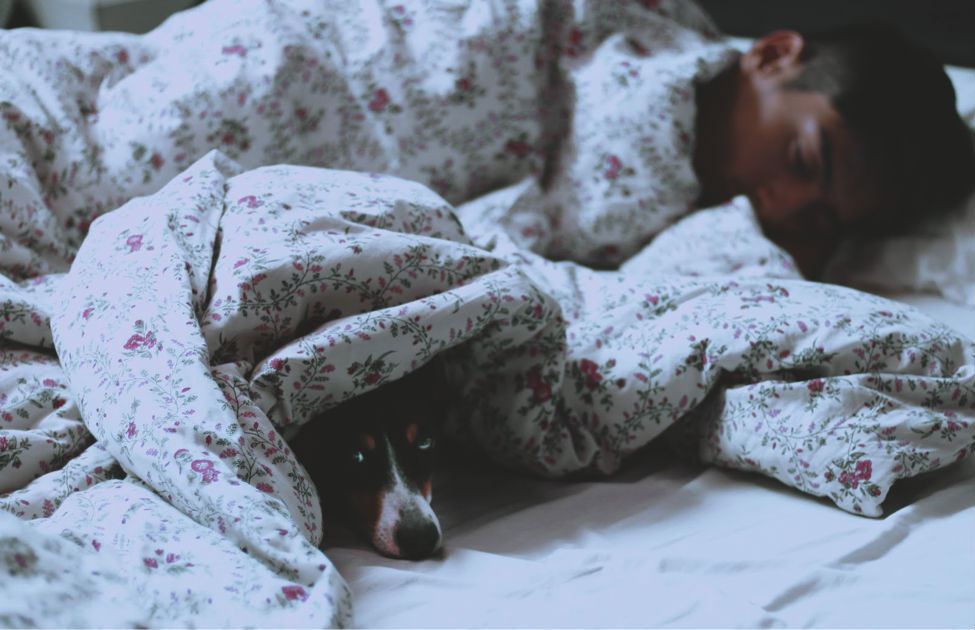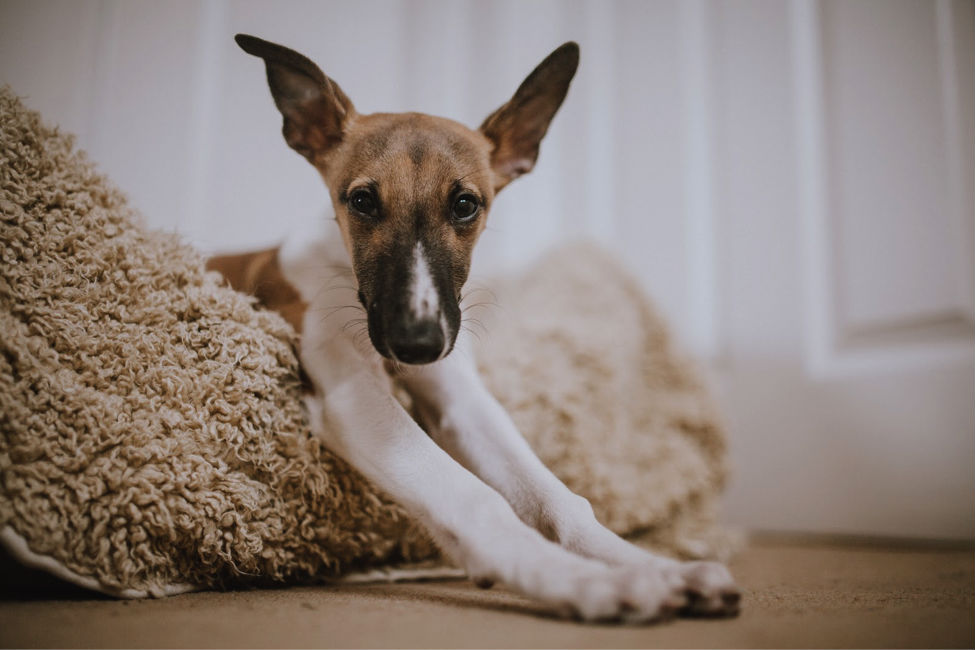Should I Let My Dog Sleep in My Bed?
By: Laurie Larson | Jan 17, 2019

Dogs are a man’s best friend, but that doesn’t necessarily mean you should do everything together.
When it comes to deciding if you should be sleeping with your pets, there seems to be some disagreement. Recent studies have reported that as many as 60 percent of dog owners regard their pet as a child or member of the family, and many of them allow their dog to climb into bed with them at night.
But when you start asking practitioners about the matter, they seem to be against the idea of sharing beds with our pets. And no, it’s not because they have some sort of aversion towards them. The main reason they’re against allowing pets to sleep in the bed has to do with our health. Surveys have shown that 53 percent of pet owners are woken up by their dogs at least once on any given night. Long-term sleep deprivation can be detrimental to both your physical and mental health, and practitioners don’t necessarily believe your dog’s place in the bed is worth it.
There are two sides to every story. Let’s dig into the pros and cons to help determine what’s best for you and your furry companion.
Paw-sitive effects of letting a dog sleep in your bed

Dog lovers who snuggle up with their pets each night will have no problem reciting the countless benefits. For one thing, pets provide a comforting presence. Everybody loves some cuddling time, but pets also add a steady supply of heat. A dog’s body temperature is usually about five degrees higher than a humans making them really good at keeping the bed warm.
Keeping a dog in the bed can also help sleepers feel safe and protected. Many people feel vulnerable sleeping alone in the dark and dogs sleeping in bed can help alleviate that fear. This greater feeling of safety and security can also contribute to the ease at which you fall asleep and feel relaxed. Among other things, the soothing comfort of hearing your pet’s rhythmic breathing by your side also helps lull you to sleep.
Sure, sleeping with pets can make you feel warm and safe, but it’s also good for your dog! Your dog will certainly appreciate being able to spend those extra hours with you in bed and it could also play a big role in strengthening the bond between you and your pet.
Back in the doghouse

As most dog owners know, sleep throughout the night isn’t always peaceful. When your dog is in the bed, you’ll be sure to know by the way he wakes you up with his kicking feet or flopping tail.
It’s not totally their fault. Dogs are polyphasic sleepers by nature, meaning that they average three sleep/wake cycles per night-time hour as opposed to humans who experience only one period of sleep over a 24-hour cycle. While nighttime is the crucial period for you to get all the rest you can, your dog will likely be waking up many times and move around. It’s also in their nature to be alert to any sounds or disruptions, so they’re more than likely already a lighter sleeper than you are.
Taking away your precious hours of sleep isn’t the only potential health hazard your pet presents. Even if you aren’t allergic to your dog, having your pet in bed can aggravate your allergies. All dogs carry allergens in their fur that they collect from outside and then bring into your bed when you invite them in. You might find yourself waking up with a stuffy nose, scratchy throat, and sneezing fits.
Making the decision: Should I let my dog sleep in my bed?
There are many important factors to consider when deciding whether or not you really wish to allow your pet in the bed with you, but what’s most important to consider is what’s best for you and your pet.
When you bring a new puppy into your life it may be tempting to impulsively decide that you want to snuggle up with them at night. You should remember that eventually the puppy will grow up into a full-grown dog.
You don’t want to have to put your dog through too many stressful changes, so if you think you’ll have trouble sharing your bed with your dog when they’re an adult, try to avoid the puppy temptation. If you are committed to letting your dog sleep with you at all stages of its life, make sure you’ve considered the size of bed you will share to be certain it’s large enough to accommodate all sleepers.
This becomes even more important when you begin thinking about the future. It may just be you and your dog sharing the bed now, but what if you have a partner later on? What if they don’t want to sleep with a dog? What if your pet doesn’t want to sleep with your partner? Obviously, your best fur friend comes first, but it’s a potential issue you should be aware of.
Additionally, you should entertain the possibility of adding more pets to your life. If you get another dog, would they also be joining you in bed or will they be sleeping on the floor? You shouldn’t stress too much about the unknowns of the future, but these are realistic issues to consider.
The verdict
Everyone’s relationship with their pet is personal and individual. Ultimately, you be the judge as you know what’s best for you.
If you decide to let your dog sleep with you and then things change later on down the road, it won’t be impossible to have them stop sleeping in your bed, and rest assured they won’t hold a grudge against you.
There are a few ways to make co-sleeping a little more practical with your pet. First off, make sure you establish your pack relationship early on. Your pet should know that their access to your bed is a privilege, not a right, and it can be revoked at any point. This will help ensure that if you do change your mind, making the shift won’t be too painful.
Secondly, make sure you stay in control. Your dog should be listening to your commands and the rules you’ve set. “Off” means “off.” If they don’t listen and start taking advantage of the space, take away their privilege so that they understand not to replicate the behavior.
And finally, get cozy! If you’re planning on sleeping with your pet, make the appropriate accommodations so that it is a pleasant experience. Consider placing blankets and pillows for your pet to create a nook and make sure to designate a specific area as their sleep space.
Here’s to happy nights of sleep!


Disclaimer: healthcareforpets.com and its team of veterinarians and clinicians do not endorse any products, services, or recommended advice. All advice presented by our veterinarians, clinicians, tools, resources, etc is not meant to replace a regular physical exam and consultation with your primary veterinarian or other clinicians. We always encourage you to seek medical advice from your regular veterinarian.

